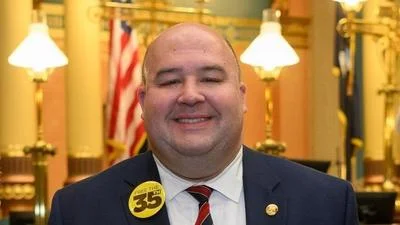Sandy K. Baruah President and Chief Executive Officer at Detroit Regional Chamber | Twitter Website
Sandy K. Baruah President and Chief Executive Officer at Detroit Regional Chamber | Twitter Website
U.S. small-business confidence experienced a decline for the third consecutive month in March, according to a report issued on Tuesday by the National Federation of Independent Business (NFIB). This decline reduced most of the confidence gains following President Donald Trump's election, as concerns about the administration's trade policy overshadowed initial optimism about potential tax cuts and deregulation benefits.
The NFIB's Small Business Optimism Index saw a 3.3-point decrease to 97.4, falling below the index's 51-year average. This marked the most significant drop since June 2022, aligning with similar declines observed in other recent surveys of consumer and business confidence.
NFIB Chief Economist Bill Dunkelberg noted, "The implementation of new policy priorities has heightened the level of uncertainty among small business owners over the past few months." He added, "Small business owners have scaled back expectations on sales growth as they better understand how these rearrangements might impact them."
Although the NFIB’s uncertainty index decreased by eight points to 96, it remained above historical averages.
The share of small business owners expecting improved business conditions fell by 16 points to 21%, the lowest since October. Similarly, the net share of businesses anticipating increased sales within three months dropped to 3%, marking a pre-election low.
This survey was conducted before President Trump announced comprehensive tariffs on April 2, which surpassed expectations and led to declines in global stock markets. Federal Reserve Chair Jerome Powell recently cautioned that the tariffs might result in both inflation and slowed economic growth.
According to the NFIB, "The impact of new tariffs is yet to be felt."
The survey also indicated a 6-percentage-point easing in the share of businesses raising average selling prices from February to 26%. In contrast, the percentage planning to raise prices over the next three months increased to 30%, the highest in a year. Additionally, a net 12% of businesses reported plans to hire more employees in the next three months, which is the lowest proportion in 11 months.






 Alerts Sign-up
Alerts Sign-up